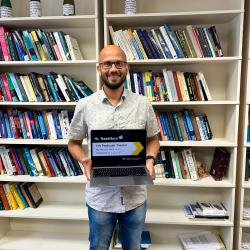Two College Alumni Named Sloan Research Fellows
Two alumni of the University of Maryland’s College of Computer, Mathematical, and Natural Sciences received 2016 Sloan Research Fellowships from the Alfred P. Sloan Foundation. One faculty member from the college also received a fellowship.
Abhinav Gupta, assistant professor of computer science at Carnegie Mellon University, and Matthew Hirn, assistant professor of mathematics at Michigan State University, were two of 126 outstanding early-career scientists recognized by the foundation this year based on their potential to contribute fundamentally significant research to a wider academic community.
Gupta received his M.S. in 2007 and Ph.D. in 2009 in computer science from the University of Maryland under the supervision of Larry Davis, professor in the Department of Computer Science. Gupta's research interests include developing methods for computers to gain a deep understanding of visual scenes, including how elements of the scene relate to each other physically and functionally. He also studies the role of language in visual learning and how people interact with their environments.
Hirn received his Ph.D. in mathematics from the University of Maryland in 2009 under the supervision of John Benedetto and Kasso Okoudjou, professors in the Department of Mathematics. Hirn’s research interests focus on the interface of harmonic analysis and machine learning. Hirn develops mathematically provable machine learning algorithms to circumvent prohibitively costly computations in scientific computing, thereby opening new avenues for scientific breakthroughs.
Each 2016 Sloan Research Fellow is awarded a two-year $55,000 grant to support his or her research interests. Administered and funded by the Sloan Foundation, the fellowships are awarded in eight scientific fields—chemistry, computer science, economics, mathematics, computational and evolutionary molecular biology, neuroscience, ocean sciences, and physics. Winners are selected through close cooperation with the scientific community. To qualify, candidates must first be nominated by their fellow research scientists and are subsequently selected by an independent panel of senior scholars.
Since the beginning of the program, 43 fellows have received a Nobel Prize in their respective field, 16 have won the Fields Medal in mathematics, 68 have received the National Medal of Science and 15 have won the John Bates Clark Medal in economics.
“Getting early-career support can be a make-or-break moment for a young scholar,” said Paul L. Joskow, President of the Alfred P. Sloan Foundation. “In an increasingly competitive academic environment, it can be difficult to stand out, even when your work is first rate. The Sloan Research Fellowships have become an unmistakable marker of quality among researchers. Fellows represent the best-of-the-best among young scientists.”







